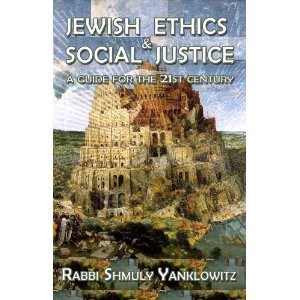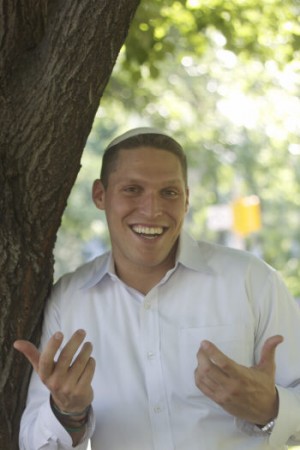Why Liberal Jews Should Read an Orthodox Social Justice Book
Rabbi Shmuly Yanklowitz’s new book, Jewish Ethics and Social Justice (Derusha Pub., 344pp, $14.95) is a must-read for Orthodox social justice activists. Unfortunately for Yanklowitz, there aren’t many of them — yet. Fortunately, the book, a collection of essays and articles by a leader of the budding Orthodox social justice movement, offers a great deal to all of us doing social justice work under a Jewish banner. Liberal Jews should read it too.
The past decade has seen a number of excellent volumes on Judaism and social justice, including There Shall Be No Needy by Rabbi Jill Jacobs, Judaism and Justice by Rabbi Sid Schwarz, and Righteous Indignation: A Jewish Call for Justice, co-edited by Jo Ellen Green Kaiser, Rabbi Or Rose, and yours truly. Yet while the readers of such books may look to Jewish texts for inspiration and support for their moral positions, they likely already hold strong progressive moral positions before they break open Jewish social justice tomes. In contrast, Jewish Ethics and Social Justice attempts to connect with a world that looks to halacha (Jewish law and legal process) as authoritative, and makes arguments for social justice from that lens. This can be both informative and distancing for the progressive Jewish reader.
For example, in an article urging that Jews get involved in the healthcare debate, Yanklowitz brings us a Talmudic passage that teaches that Jews are responsible equally for the health of Jews and non-Jews. He continues with a passage from the Jewish legal code Shulchan Aruch, which teaches that this responsibility includes providing medical assistance and necessary drugs. Failure to do so is akin to shedding blood.
On the one hand, such passages are extremely useful for those of us who want to talk about the moral implications of poor healthcare. We can use Rabbi Yanklowitz’s sources to preach that our rabbis have been considering these issues for millennia. And not just on healthcare. Rabbi Yanklowitz provides thorough textual sources and halachic arguments on a variety of important issues, including environmental responsibility, fair trade, workers’ rights, immigration, to name a few.
On the other hand, I was struck that Yanklowitz felt it necessary to prove to his community that the Talmud cared about the health of non-Jews in order to get them to listen. While I was glad to know that the rabbis thought about these issues, I was also clear that my own commitment to care for the health of non-Jews would have remained even if I learned that the Talmud taught otherwise.
In a sense, Jewish Ethics and Social Justice forces the non-Orthodox among us to wrestle with our relationship with Jewish text and tradition. It begs the question, perhaps a reformulation of a somewhat overused question I remember from my Jewish youth group days: “Am I a Jewish Activist or an Activist Jew?” What is the directionality of my connection with Judaism – does it strengthen existing morality beliefs that come from outside of the tradition, or does it form the basis of my morality? And if the latter, is it through traditional halacha, or something harder to define?
Yanklowitz writes for an audience that sees halacha as authoritative as a moral code, and so the answers to those questions are clear. They can be much more complicated for liberal Jews. Personally, I began to care about social justice because I went to a justice-conscious Jewish day school, and was taught that that’s what Jews do. There, I came to believe that our shared story of liberation inspires us to dream of liberation in every generation. And through further journeying, I came to feel called by our mystical traditions, the idea that God/Everything is One, that we are all interconnected, and therefore all responsible for one other. Those ideas set me on a path, but then were strengthened and given form by the contemporary progressive values of my family and community.
Though I still believe that the Torah and subsequent Jewish texts contain important truths within them, I don’t believe that they are literally true. Rather, I believe that my ancestors wrote down their stories and laws in an effort to live holy lives and help their descendents do the same. So when I come back to Jewish texts, it is not to convince myself that the social justice issues I care about are important, but rather to inspire my work, connect me with generations of Jews whose legacy I hope I am continuing, and remind the public that our tradition cares about these issues.
This is, of course, very different from the Orthodox Jewish perspective. Whether or not all liberal Jews have followed this trajectory, my guess is that for most, our connection to social justice is not primarily motivated by traditional halacha. Given this, making our arguments as halachic arguments is the wrong starting place, or even disingenuous for those who feel more disconnected from traditional Jewish law on most other issues.
So, if you aren’t Orthodox, and/or you don’t set your moral compass by traditional Jewish law, why read this book? Why pay attention to a set of arguments that base their authority on a legal system that you likely don’t hold by? Well, a few reasons.
First, Jewish Ethics and Social Justice contains innumerable gems of Jewish teaching that will help any Jewish activist think through the Jewish connections to their work. Even if we don’t look to these texts in order to know what to care about, reading these texts helps us enter a conversation with our ancestors about how to live, and connects our search for a moral life with theirs. And, for those of us who are raising up our faith voices in the public sphere, Jewish Ethics gives us plentiful source material to preach on the Jewish mandate on our issue at rallies or meetings, or give a dvar torah (sermon) on issues of concern.
Second, Jewish Ethics is an interesting and inspiring introduction to Jewish legal process. Whether citing the Talmud, Maimonides, Rav Kook, or Rav Soleveichik, Yanklowitz is a masterful reader of text. If you are interested in how traditional Jews use sources to make arguments, this is a good place to start.
Most important, the book is a living snapshot of a new movement in Judaism. Whether or not we value halacha as moral authority, we can read Jewish Ethics to understand how one person has been able to reach a part of our community that for so long had been resistant to engage with social justice issues. Through his essays and articles, Yanklowitz lovingly but firmly gives tochacha (rebuke) to his peers. Whether muckraking about the treatment of non-Jewish workers at Kosher meat plants or writing about Jewish responsibility to protect the environment, Yanklowitz calls on Orthodox Jews to think beyond the bounds of their community to engage with the more universal aspects of the Jewish tradition.
To read Yanklowitz, then, is to read the social history of a movement wrestling with change, from a leader who knows its tradition well enough to challenge it.
![[the current issue of ZEEK]](../../image/2/100/0/5/uploads/leftistethicistgraphic-52842c6a.png)
- 5000 Pages of Zeek
- Founded in 2001, Zeek was the first Jewish online magazine, and we have over 5000 pages online to prove it, all available free of charge. Read more in the Archive.
More articles by
Rabbi Margie Klein Ronkin
More articles in
Faith and Practice
- To-Do List for the Social Justice Movement: Cultivate Compassion, Emphasize Connections & Mourn Losses (Don’t Just Celebrate Triumphs)
- Inside the Looking Glass: Writing My Way Through Two Very Different Jewish Journeys
- What Is Mine? Finding Humbleness, Not Entitlement, in Shmita
- Engaging With the Days of Awe: A Personal Writing Ritual in Five Questions
- The Internet Confessional Goes to the Goats



